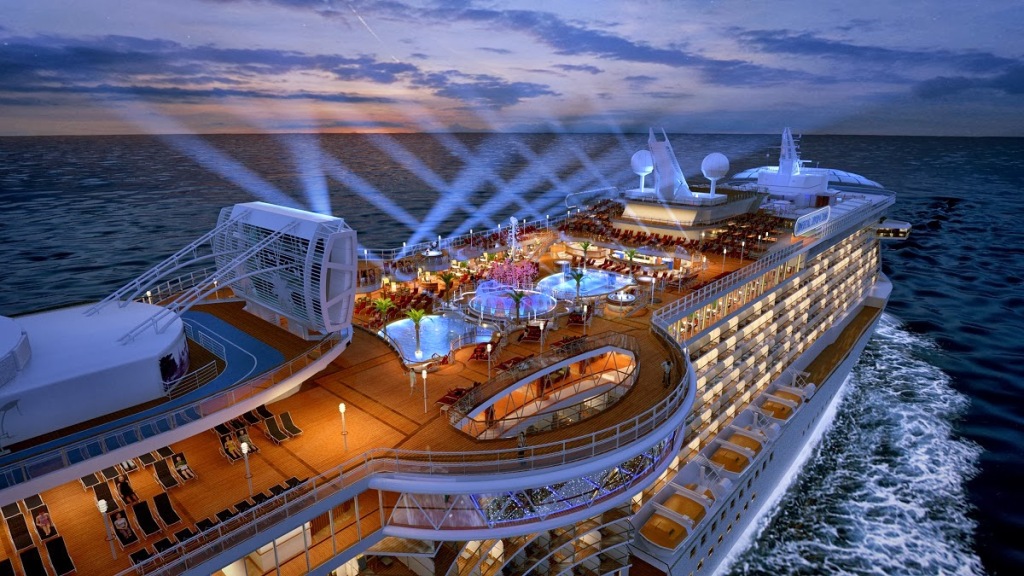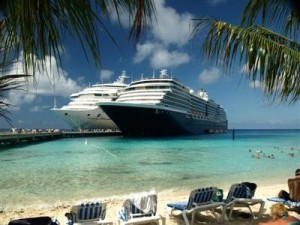 The current fanaticism for luxury cruises invites some analysis.
The current fanaticism for luxury cruises invites some analysis.
I considered some thoughts on this strange aquatic holiday hyperreality, because it’s quite obviously – perhaps too obviously – a meaty motif through which to make some observations about the nature of modern life.
But I’ve not been on a luxury cruise. The closest I’ve come is crossing the Tasman, which ranks as eight of the least pleasant hours of my life.
I’ve never been attracted to ‘resort-like’ experiences, and agree with Stephen Fry’s acute observation that anywhere bearing the name Paradise, simply isn’t.
But, frankly, you’re far better off reading this 1997 Harper’s article by David Foster Wallace, entitled Shipping Out: On the (Nearly Lethal) Comforts of a Luxury Cruise (later published as ‘A Supposedly Fun Thing I’ll never Do Again’).
 Here’s a few worthwhile grabs:
Here’s a few worthwhile grabs:
“I have, in one week, been the object of over 1,500 professional smiles”
“I have heard – but am powerless to describe – reggae elevator music. I have met Cruise Staff called with the monikers ‘Mojo Mike’, Cocopuff’ and ‘Dave the Bingo Boy’”
“The waiter and busboy keep circling the table, going “Finish? Finish?” while Esther and Trudy have exchanges like: Honey, you don’t look happy with the potatoes. Whats the problem?””
“It emerges that when we’re not negotiating ports to piers, a kind of auto captain pilots the ship. That helps explain why Captain G. Panagiotakis usually seems so phenomenally unbusy, why his real job seems to be to stand in various part of the ship and try to look vaguely presidential, which he would except for his habit of wearing sunglasses inside, which makes him look more like a Third World strongman”
“There’s something about a mass-market Luxury Cruise that’s unbearably sad. The word “despair” is overused and banalised now, buts it’s a serious word and I’m using it seriously.”
“One way (to avoid decay) is to “triumph” via the rigors of self-improvement. But there’s another way too: not through titivation, but titillation; not hard work but hard play. In this regard the (ships) constant activities, festivities, gaiety, song; the adrenaline, the stimulation. It makes you feel vibrant, alive. It makes your existence seem con-contingent. The hard-play option promises not a transcendence of death so much as just drowning it out”
“This is advertising (i.e., fantasy-enablement), but with a queerly authoritarian twist. The promise is not that you can experience great pleasure but that you will.”
“Not until Tuesday’s Lobster Night at the 5 star Caravelle Restaurant did I really empathetically underestimate the Roman phenomenon of the vomitorium”
 “The point is that, standing here next to (another, bigger, better, ship) I start to feel envy…and I know it’s a delusion, this envy of another ship, but still it’s painful. It’s also representative of a psychological syndrome that I notice has gotten steadily worse as my Luxury Cruise wears on, a mental list of dissatisfactions that started off picayune but has quickly become despair grade”
“The point is that, standing here next to (another, bigger, better, ship) I start to feel envy…and I know it’s a delusion, this envy of another ship, but still it’s painful. It’s also representative of a psychological syndrome that I notice has gotten steadily worse as my Luxury Cruise wears on, a mental list of dissatisfactions that started off picayune but has quickly become despair grade”
“I know the source of my dissatisfaction is not the (ship) but rather that ur-American part of me that craves pampering and passive pleasure: the dissatisfied infant part of me that always indiscriminately WANTS”
And this summary insight:
“Death notwithstanding, we’re maybe now in a position to appreciate the falsehood at the dark heart of the (cruise) brochure. For this – the problem to sate the part of me that always and only WANTS – is the central fantasy the brochure is selling. The thing to notice is that the real fantasy here isn’t that the promise will be kept but that the promise is keepable at all.
This is one, big lie. And of course I want to believe it; I want to believe that maybe the ultimate fantasy vacation will be enough pampering, that this time the luxury and pleasure will be so completely and faultlessly administered that my infantile part will be sated at last. But the infantile part of me is, but it’s very nature and essence, insatiable. In fact, its whole raison consists of its instability. In response to any environment of extraordinary gratification and pampering, the insatiable-infant part of me will simply adjust its desires upward until once again levels out at its homeostasis of terrible dissatisfaction. And sure enough, after a few days of delight and then adjustments on the (ship); the pamper-swaddled part of me that WANTS is now back, and with a vengeance”
Leave a comment